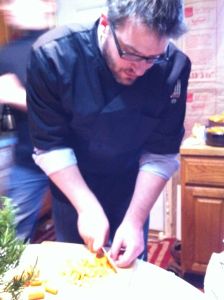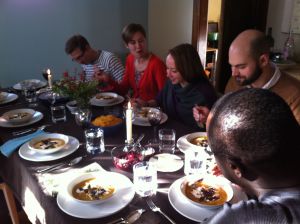My husband Jason is a true amateur chef—at least if you understand amateur as a French word derived from amare: to love. He cooks because he loves to, and he cooks for the purpose of showing love to others.
* * * * *
One of my first significant encounters with Jason’s cooking took place at a birthday dinner he prepared for a friend—a friend who happened to be (and still is) his ex-wife’s partner.
At the time, the birthday dinner plans didn’t strike me as unusual. Jason and I had been dating for about a month, and I knew he was close to his ex and her partner. I had also heard (but hadn’t yet fully experienced) that Jason was a great cook. Why wouldn’t he offer to make the celebration dinner?
That evening, we all chatted as friends arrived, pouring glasses of wine, helping to set the table, and keeping an eye on one-another’s children as amazing scents wafted from the kitchen where Jason was working his magic.
It wasn’t until we sat down around the table to give thanks for the food and for our friend on her birthday that the beautiful peculiarity of the event struck me—with enough weight to trigger a physiological response: goose bumps on my arms and a tingle of emotion rising up behind my eyes.
My boyfriend just prepared a dinner to celebrate his ex-wife’s partner, I thought, with amazement.
The sentence rolled through my mind like a ticker tape all evening, taking on slightly new meanings and more weight each time. My own life had gone through its share of rough waters the past few years, deadening what had once been an optimistic expectation that there was goodness in the world. That birthday dinner made me believe in the possibility of redemption. It suddenly felt like anything that seemed impossible to the world was, in fact, possible. Especially around a table.
* * * * *
 As our relationship developed over the months, Jason continued to surprise me with his capacity for rendering not just delicious flavors, but also soul-feeding grace. I soon realized that for him, the food and the emotional substance go hand in hand.
As our relationship developed over the months, Jason continued to surprise me with his capacity for rendering not just delicious flavors, but also soul-feeding grace. I soon realized that for him, the food and the emotional substance go hand in hand.
My first Christmas with Jason’s family (just days after we got engaged) was my introduction to his extended family and their collective love for food. Jason’s aunt is African American, and in her kitchen, Jason and his cousins combined all they had learned from Aunt Gina and all they had taught themselves, creating a truly fusion Christmas dinner. The traditions of the older generations blended with the new, as recipes from the African-American South were served up next to recreated dishes that had recently been tasted in Chicago’s hippest restaurants.
In our own home after we married, “What’s for dinner?” became our young daughters’ most eagerly-posed question. Their very favorite answer was one that rose unmistakably from the kitchen to their noses—roasted cumin, peppercorns, coriander, cardamom, and cinnamon being ground together for Jason’s Tikka Masala. I loved watching our daughters’ tastes and appreciation for delicious and new foods develop. I also loved the subtle yet powerful ways our two families first got to know one another and then blended and bonded over conversations around the table. Dinners that take time and care to create, it seems, demand meal times that mirror that time and care.
Jason’s cooking skills also make our home a favorite destination for friends—those who love to eat as well as those who love to cook. As our circle of food-loving friends began to grow, Jason and I decided to host an annual chili and cornbread cook-off. The event has evolved and grown over the years (eight and counting!), but the heart of the event has stayed the same: It’s an opportunity for us to bring together friends from all parts of our lives—friends we know from church and friends from the local music scene, foodie friends and work friends, family from Chicago and friends we know through our daughters’ schools. The event lets us gather the often-disparate parts of our lives—each with their own cooking styles and secret family recipes—and create a single whole, a representation of who we are and who we love.
* * * * *
I won’t lie—when it comes to Jason’s cooking, the food alone is an amazing thing. But it’s the spaces those meals create that I love most.
Those of us who grew up in the church tend to see The Table as a powerful metaphor, but that doesn’t mean we can always see or articulate how that metaphor plays out in our Monday-through-Saturday lives. I saw it clearly for the first time at that birthday dinner Jason cooked so many years ago. And once I recognized it for what it is, I started to see it everywhere: in the words our now-teenage daughters share with us over dinner, in the collaborative bustle in Aunt Gina’s kitchen, in the beauty of diverse friends gathered together for a co-created meal in our home. It begins to seem that some level of powerful grace and forgiveness—of authenticity and wholeness—is always possible when people sit down together for a meal.
